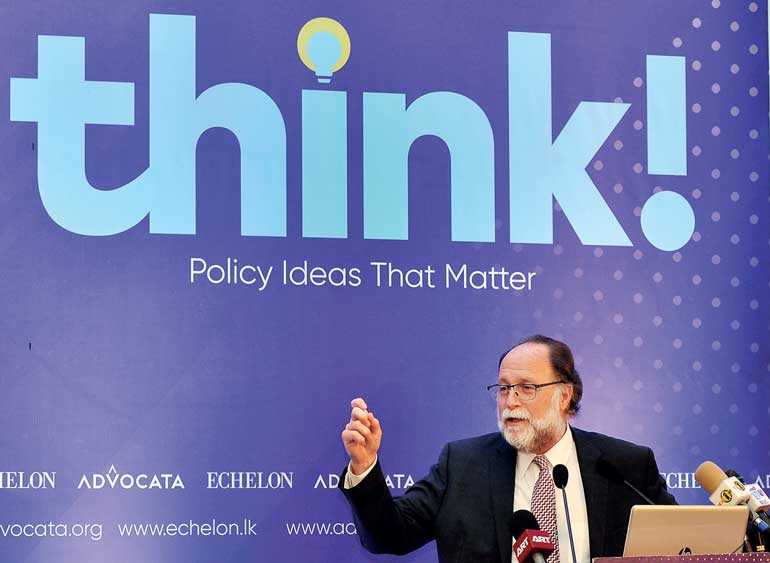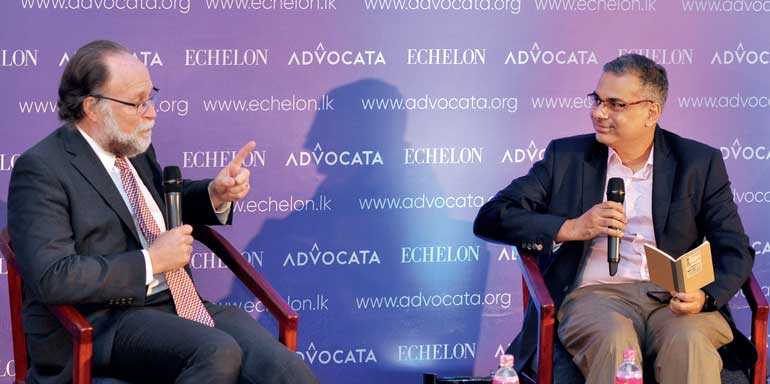Sunday Feb 22, 2026
Sunday Feb 22, 2026
Monday, 21 May 2018 00:00 - - {{hitsCtrl.values.hits}}

Harvard University’s Center for International Development Director Prof. Ricardo Hausmann
Many advanced nations from Singapore to the US have open policies that allow people to migrate easily bringing knowledge and skills to transform economies and create new jobs, a top Harvard economist said.
Allowing brains to move brings skills in faster, and tends to have a multiplier effect in jobs and economic activity, Ricardo Hausmann, from the University of Harvard, told a seminar organised by Colombo-based Advocata Institute.
In the US, every foreign-born Science, Technology, Engineering and Mathematics (STEM) graduate was found to help create 2.61 additional jobs, Hausemann said.
Technology is not limited to tools and codes/routines/procedures. These can all be easily transferred. What is difficult to transfer is tacit knowledge, knowledge embedded in the human mind through experience. Tacit knowledge includes insights, intuition and personal wisdom gained through experience. This is know-how and something that is difficult to extract and codify.
Know-how takes a long time to acquire, like becoming a skilled surgeon or an anaesthetist. To carry out a successful operation both were needed.
Producing complex goods requires different types of know-how which a single person simply did not have. In simple agriculture of a different age, a single farmer knew how to grow seed, cultivate, breed and look after buffaloes, make or repair his plough and produce his fertiliser.
But in modern agriculture where genetically engineered seeds, combined harvesters and fertiliser were used, he simply did not have the knowledge. An advanced society possessed a lot of know-how, but it was in the minds of many different people.

Harvard University’s Center for International Development Director Prof. Ricardo Hausmann with Moderator JB Securities CEO Murtaza Jefferjee Pix by Ruwan Walpola
Scrabble theory
To produce a good, a team of people had to come together, like making a word out of different letters when playing scrabble. While some letters may be available, others were not.
“So if you are missing a letter, the other letters would become less valuable. So you would give a lot to have this other letter.
“I like to say that an anaesthetist working on his own is not much better than a bad economics lecturer. The only thing he does is put people to sleep.”
“So if you bring different skills, you can make more things. They are complements, not substitutes. There are enormous benefits in different people working together.”
“In some sense the secret of development is to get more letters and express them in different words and longer words.”
He says it is difficult to move know-how into brains. Author Malcom Gladwell had claimed that it took 10,000 hours (about 14 years) to learn, practice and acquire a world class skill.
“So how do you move know-how? How do you get more know-how to Sri Lanka? We know it is difficult to put know-how to brains,” Hausmann says.
“It is much easier to move brains. It is a fundamental intuition.”
Moving brains
Brains moved through migration, foreign direct investment and diaspora networks, when people who had originally migrated out, came back.
Moving brains allowed a geographical region to move into entirely new products and keep boost productivity in established sectors, he said.
In Sri Lanka, Camso-Loadstar, now a global solid rubber tyre company was founded by a foreign national teaming up with a local partner.
US car companies Ford, GM and Chrysler were founded by people who worked for Oldsmobile. Oldsmobile was founded by a German who worked for Daimler-Benz.
Silicon Valley founded by 10 people who were hired from AT &T Bell Labs in New Jersey to Shockley Semiconductor. Eight broke away to form Fairchild Semiconductor.
Ex-Fairchild workers then founded a number of other companies including Intel. About 57% of Silicon Valley workers are now foreign born, 25% were out of state.
“Only 18% were born in California, even though it has a population of 40 million, twice as big as Sri Lanka,” Hausmann said. “Silicon Valley would not exist if it was based on locally grown talent.”
Hausmann himself is originally from Venezuela.
Sri Lanka’s IT sector is small and not growing as fast as countries that had easier access to foreign talent.

Wage differential
Wages were found to be lower in Sri Lanka than in India, he says.
However IT wages are higher than in other sectors in the island. IT graduates could find work easily suggesting that skills were in short supply.
Sri Lanka a net was exporter STEM workers, Hausmann says. About 23% of engineering and science graduates and 20% of computer science graduates leave the country to work abroad each year he says.
The low inflow of foreign workers does not compensate for outflow, he says.
Apparel manufacture in Bangladesh was pioneered by a Desh Garments in 1977, in a joint venture with Daewoo, who took 126 workers of various disciplines to train in their country. By 1988 ex-Desh workers had set up 56 companies.
Foreigners who move tended to create more jobs though the common perception was that they ‘stole’ jobs.
In Singapore now 45% of the population was foreign born, “People say we want to be like Singapore,” Hauseman said. “But they would not have gotten where they were with only home grown ‘letters’. They had to attract ‘letters’.
The foreign born population of Hong Kong was 40%, he said.
Stealing jobs or creating jobs?
It was not just obviously technological degree holders that transformed countries, he said.
Albania, an ex-communist state had at one seen large scale migration into Greece.
When the Great Recession credit bubble broke, hitting the Greece’s deficit spending government and its economy, large numbers returned boosting Albania’s workforce 5%. The people who went to Greece were supposedly low skilled.
The standard argument goes that, if the workforce increased unemployment would rise 5%. Or wages would fall.
“Well, unemployment went down and wages went up,” Hausmann said. “And why? The people who returned were not the same people that had left in terms of know-how they possessed.”
Agricultural workers for example had worked in green houses.
“They built green houses and hired neighbours,” he says. “And there was a boom in tomatoes and other agricultural exports.”
Panama had seen a spectacular boom in services, which was very skill intensive.
The country had built special economic zones with tax holidays. The country wanted to attract international headquarters.

Horrible immigration laws
But investors who wanted to come, wanted exemption from immigration laws.
“So Panama has a horrible immigration policy as bad as that of Sri Lanka,” Hausmann says.
“They had closed the door on immigration but they opened two windows. People came in through the windows.
“So foreigners came in and there was a boom in construction and everything else and wages of Panamanians skyrocketed,” he says.
Still only 4.7% of the population is foreign born in Panama.
“It is one foreigner in 27. Not like one is 7 in the US, or one it two in Singapore,” he says. “And everybody complaints about that.
“It doesn’t matter what level of migration is. Australians are at 27% migration and they think it is too high. Panamanians are at 4.7% migration and they think it is too high.
“Sri Lankans are at 0.1% migration and they think it is too high.”
Sri Lanka could grow fast with immigration law reform, he says.
Though board of investment companies were allowed to bring some foreign workers, their spouses are not allowed to work.
Typically professionally qualified people married qualified people.
They also cannot choose a different job after they come.
There was no path to permanent residency or citizenship. It was much more difficult for a non-BOI firm to access foreign talent.
Approving vs Attracting Talent
Hausmann’s team had done a comparative study reviewing immigration laws of Hong Kong, Singapore, Indonesia, Thailand and Vietnam. They had also looked at Saudi Arabia.
The more economically advanced have sophisticated immigration systems that have moved from being systems that strictly authorised the entry of foreign workers, talent, and capital, to systems that promote their entry, he says.
They had a wide variety of visas for skilled, semi-skilled, trainees, managers and entrepreneurs. There were talent visas.
He says immigration reform should be part of an overall effort to draw talent, foreign direct investment and export diversification.
More visa categories should be created. If here is a path to residency more skilled workers will come.
He says immigration reform is a ‘low hanging fruit’ that can be implemented easily unlike infrastructure which needs lots of money.
“Sri Lanka may have the talent and the people for the current economy, but does it have the talent and the people for the economy it wants to have?” Hausmann says.
“To get there, Sri Lanka will need to open up for more inflow of foreign know-how the way all prosperous countries have done already. This means more FDI, more return diaspora and higher inflow of foreign workers.”
Sri Lanka is ‘weird’ he say because there is no path to citizenship unlike countries that have become prosperous fast.
Analysts say Sri Lanka’s immigration laws are even ‘weirder’ than people realise.